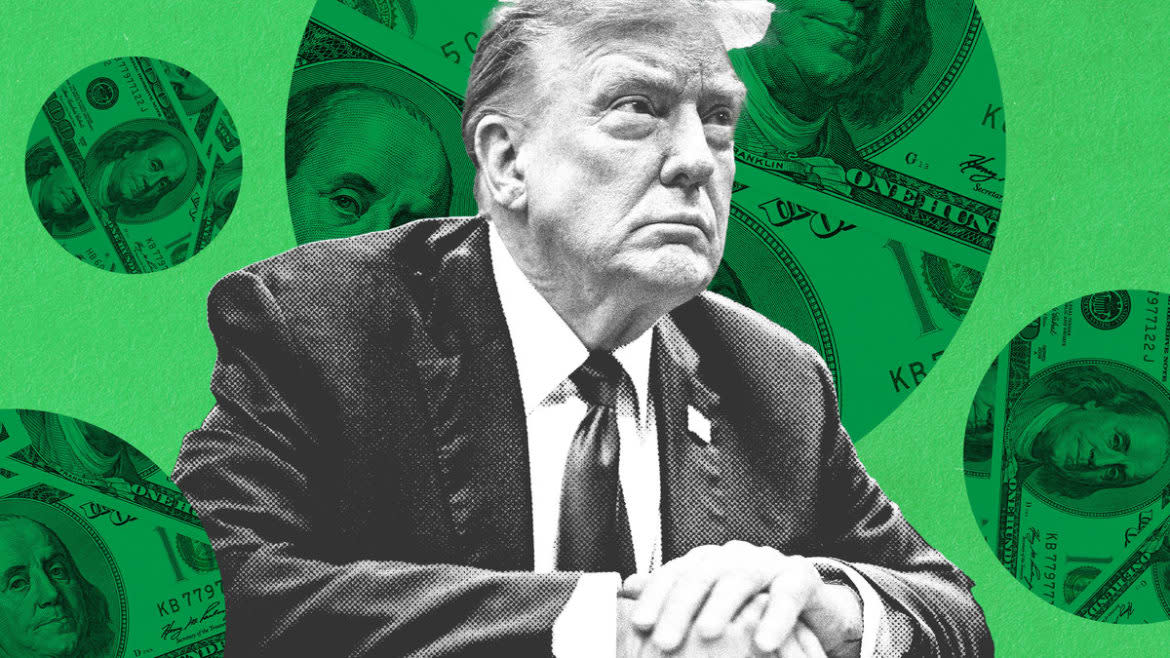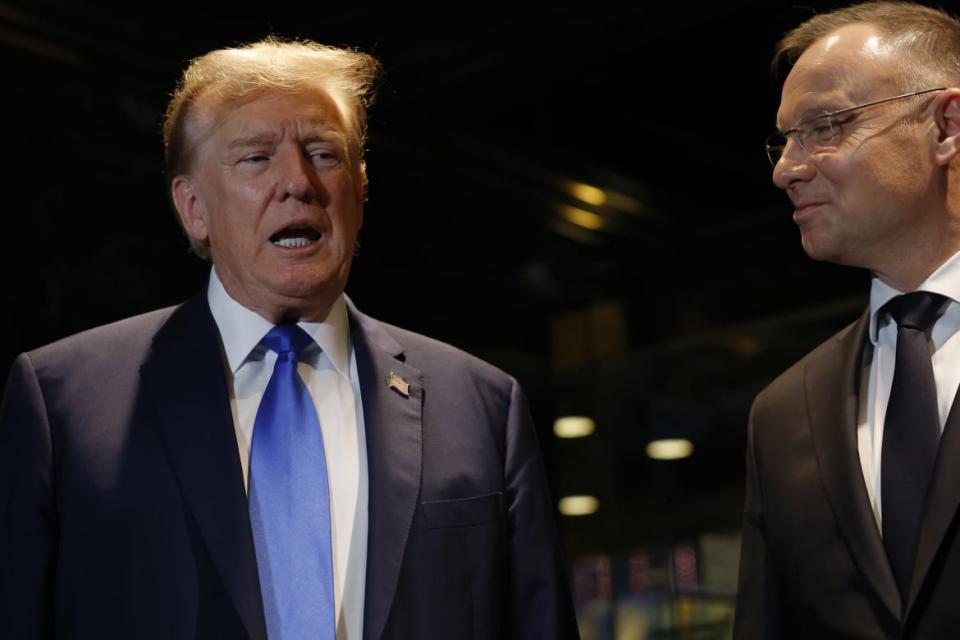Complaint Asks the FBI to Probe Trump Claims on a $50 Million Loan

Pay Dirt is a weekly foray into the pigpen of political funding. Subscribe here to get it in your inbox every Thursday.
A watchdog group is asking the Justice Department to investigate whether Donald Trump repeatedly lied in sworn statements to the federal government—including his own administration—about a $50 million loan that apparently never existed in the first place, and which could be evidence of tax evasion.
The criminal complaint, filed on Thursday by watchdog Citizens for Responsibility and Ethics in Washington and first obtained by The Daily Beast, asks the FBI and the Justice Department’s Public Integrity Unit to probe whether Trump “knowingly and willfully” lied about the mystery loan on his personal financial disclosures.
Trump has filed nine of those annual statements with the Federal Election Commission and the Office of Government Ethics over the years, personally swearing to their accuracy, which could expose him to criminal liability if the claims are found to have been intentionally false.
Trump’s $50 Million Mystery Debt Looks Like ‘Tax Evasion’
The complaint comes after The Daily Beast first reported in January that the court-appointed special monitor in Trump’s New York business fraud case had buried a bombshell claim in a footnote to a status report: A mysterious $50 million loan, which Trump reported owing to one of his own LLCs, “never existed.”
Legal experts previously told The Daily Beast that the revelation suggests the arrangement may have allowed Trump to evade taxes on tens of millions of dollars in income.
In a statement to The Daily Beast, Noah Bookbinder, president of CREW, said Trump’s continual lies are self-serving and incompatible with the rule of law.
“Donald Trump has a long history of lying about his finances for his personal benefit—he’s on trial in New York right now for doing just that—and this appears to be another example,” the statement said, referencing the criminal hush money trial now underway in Manhattan.
Bookbinder called it “odd” for Trump to apparently lie about a debt that never actually existed. But while the motivation behind the claims is still unclear, he said, “lying about finances is something Donald Trump routinely does to help himself, and there are several ways this could have helped him.”
That’s not to say there aren’t any possible explanations. As the complaint notes, The Daily Beast and other outlets have reported that Trump’s claims about this loan may indicate a tax avoidance scheme, known as “debt parking,” potentially to the tune of $48 million. (His administration’s policies were overall friendly to debt collectors.)
While CREW’s complaint doesn’t directly allege tax evasion, it does say that Trump’s alleged lies about this loan could constitute a “material false statement” that, among other things, would prevent officials from assessing whether Trump was “in compliance with applicable laws and regulations.”
“The FBI and the Department of Justice should investigate and, if the facts support it, act to ensure accountability for this lawlessness,” Bookbinder’s statement said. “Donald Trump’s habit of lying and placing himself above the law has no place in a republic governed by the rule of law."
CREW’s 13-page complaint, addressed to FBI chief Christopher Wray and the head of the DOJ’s Public Integrity Unit, Corey Amundson, walks through the complex history behind the loan—an inscrutable irregularity in Trump’s disclosures that has flummoxed financial reporters for years.
The mystery was revived this January, when a court filing in Trump’s New York fraud case delivered the explosive news that the loan never existed at all.

Former President Donald Trump speaks as he meets with Polish President Andrzej Duda at Trump Tower on April 17, 2024 in New York City.
In a letter to New York state judge Arthur F. Engoron, special monitor Barbara Jones—a widely respected former federal judge charged with reviewing the Trump Organization’s finances as the trial proceeded—claimed that, after “several” discussions with Trump Org officials, the company recently informed her that the loan “never existed” and would be removed from future government disclosures and financial statements.
“When I inquired about this loan, I was informed that there are no loan agreements that memorialize the loan, but that it was a loan that was believed to be between Donald J. Trump, individually, and Chicago Unit Acquisition for $48 million,” Jones wrote, referencing the name of the LLC that had allegedly held his debt.
“However, in recent discussions with the Trump Organization, it indicated that it has determined that this loan never existed—and thus that it would be removed from any upcoming forms submitted to the Office of Government Ethics (OGE) and would also be removed from subsequent versions of [corporate financial statements],” Jones wrote.
Weeks later, Engoron found Trump and his company guilty of engaging in years-long, systematic business fraud, misrepresenting their assets in order to gain favorable terms from lenders. He fined Trump and other Trump Org officials $364 million for bank fraud, and has since bestowed “enhanced” powers on Jones as Trump’s financial babysitter, extending her role both in scope and duration.
In a response to Jones’ filing last January, Trump’s legal team accused her of “falsehoods” and “deliberate mischaracterizations,” claiming the Trump Org never told her the loan wasn’t real. As evidence, the response included an internal company memo about the loan—dated Dec. 4, 2023—which Trump’s lawyers said they’d given to Jones.
But as the CREW complaint points out, that memo “does not evidence the loan’s prior existence,” but “merely represents that as of December 4, 2023, ‘no amounts are due or payable’ and ‘no liabilities or obligations are outstanding’” for a loan related to Trump International Hotel & Tower Chicago.
That internal Trump Org memo, however, has an even more significant inconsistency: It doesn’t claim that the loan involved Trump personally, as he stated in all of his disclosures. Instead, the memo describes the arrangement as between two Trump-owned LLCs, a “$48,000,000 Springing Loan from Chicago Unit Acquisition LLC to 401 Mezz Venture LLC.”
And yet, in a conversation with The Daily Beast the same weekend the Trump Org was preparing its response to Jones in January, the company’s chief financial officer Alan Garten contradicted the memo—which his own company had inked the previous month. Instead, Garten insisted that the Chicago LLC actually owed the money to Trump.
Trump Bond’s Cayman Connection ‘Stinks to High Heaven’
“Yes, the loan existed,” Garten told The Daily Beast in January, claiming the debt was “an internal loan” where Trump “lent money to the entity that he owns.”
But again, as the CREW complaint notes, all of Trump’s financial disclosures—including his most recent amended version, approved by the Office of Government Ethics last October—clearly state that it was the other way around: It was Trump who owed the money to his LLC.
Still, that’s not the only oddity about this loan.
“There are several other factors that would indicate that the Chicago Loan never constituted a bona fide debt obligation,” the CREW complaint reads.
For one, Trump has claimed that this Chicago LLC is worth next to nothing—between $1,000 and $15,000—despite the fact that its assets should include the tens of millions that it is owed from Trump. There’s also no public record of this loan, which, the complaint says, “is contrary to how most real estate loans of that magnitude are handled.”
Additionally, the complaint notes, Trump’s own statements about the debt “seemed to discount the loan’s legitimacy,” citing his 2016 claims to The New York Times that “we don’t assess any value to [the loan] because we don’t care.”
CREW further identifies “several reporting irregularities” about the loan in Trump’s disclosures.
“If the Chicago Loan had been a bona fide debt obligation worth more than $50 million, Mr. Trump would have had a corresponding obligation to report it as a ‘receivable’ or similar asset with a comparable value” on his financial disclosures, the complaint states. His disclosures, however, have actually made a variety of incompatible statements in that regard.
In fact, it was only last August that Trump finally first reported that Chicago Unit Acquisition LLC didn’t just have a menial value in the thousands, but owned a $50 million-plus underlying asset, described as an “intercompany receivable from filer” (i.e., Trump personally).
“That single disclosure does not negate his repeated failure to recognize the loan and its value as a bona fide receivable asset on the eight previously filed PFDs nor does it comport with the more recent disclosures made to Judge Jones that the Chicago Loan ‘never existed,’” the complaint notes. That August disclosure also contradicts the internal Trump Org memo dated four months later, where Trump is no longer listed as a personal party to the loan.
After nearly a decade of questions, disclosures, statements, and public scrutiny, this massive loan—along with its basic purpose and structure—is still a mystery. The recent flurry of incompatible claims and filings from the Trump Org have only made it more confusing.
The January letter from Jones, however, if accurate, provides some potential clarity—and the only real lead in years. According to legal experts, it could very well be tax evasion.
Trump Caught Moving Money Around to Pay Massive Tax Bill
Tax experts told The Daily Beast that, typically, the forgiven amount of a loan—in this case $48 million—would qualify as reportable taxable income. Instead, those experts said, Trump very well could have invented this loan to make it look like the debt wasn’t forgiven, but repurchased from Fortress—a scenario where it wouldn’t be income.
“It would appear, assuming Judge Jones’ letter is accurate, that this amounts to tax evasion,” Martin Lobel, a prominent Washington, D.C., tax attorney, told The Daily Beast at the time.
Remarkably, this actually aligns with one version of the story that Trump has previously told himself.
In a 2016 interview, Trump told The New York Times that he had indeed purchased this loan himself, stating that he bought it back from a group of banks.
“I have the mortgage. That is all there is,” Trump said at the time. “Very simple. I am the bank.”
Get the Daily Beast's biggest scoops and scandals delivered right to your inbox. Sign up now.
Stay informed and gain unlimited access to the Daily Beast's unmatched reporting. Subscribe now.


